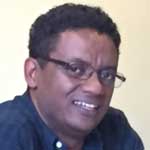
Fortune News | Feb 19,2022
Jun 7 , 2020
By Dawit Wondimagegn
It might be tempting to engage in the debate surrounding the World Health Organisation (WHO) and its embattled director-general, Tedros Adhanom (PhD). But there is more substance to be found by looking at the history of the WHO and its shaky relationship with the politics that underlies global public health policy, writes Dawit Wondimagegn (MD) (dawitwondimagegn@gmail.com), associate professor of psychiatry at Addis Abeba University’s School of Medicine and chief executive director of Tikur Anbessa Hospital.
Criticism is a constant companion of the United Nation's agencies and their leaders. The ongoing criticisms of Tedros Adhanom (PhD), current director-general of the World Health Organisation (WHO), is one of many examples.
The temptation to engage in the current controversy is huge, but it is never a good time to judge anyone's performance in the middle of what they are doing. Terms of office are created for a reason, and it is crucial to respect that. However, since the issue hits close to home, we can arrive at it from a historical perspective. If human beings are good at one thing, it is that we are masters at repeating history.
If we look deep into the past, it is almost impossible to find something completely new. Life is mostly a script performed by different actors.
Halfden Mahler (MD) and Hiroshi Nakajima (PhD), the third and fourth director-generals of the WHO, respectively, led the agency for a quarter of a century between them. Arguably, they led the Organisation in its heyday, despite being two contrasting figures.
Mahler is remembered as a charismatic, visionary leader who had the boldness to take the WHO to the uncharted territory of politics. Nakajima was a conciliatory figure who erred on the side of compromise and suffered more personal criticism than accolades.
The influence the Organisation has on matters of international health has been waxing and waning since its inception. As one of the UN agencies, it has three functions. One of its first functions is to set normative standards - acceptable requirements and procedures across all member states based on the available evidence.
Another function is the provision of technical advice and support for medical matters for member states as it is doing now during the COVID-19 pandemic. The WHO has had remarkable success in executing these two functions with minimal controversy. But the Organisation became increasingly controversial when it started to take on its third function, which is advocating for health policy, taking it into the unpredictable territory of the social and political.
This development in terms of function was always going to be a difficult one. The agency was and still is founded on grounds that are shaky and constantly shifting. Membership is open to all states unless there are extenuating circumstances. It is funded by member states that have equal votes in its annual assembly, who gather to evaluate the agency and determine its direction.
This arrangement sounds acceptable on the surface because it gives all members states an equal chance at a democratic process. However, the devil is in the details. Even though all member states have equal voting rights, they do not contribute equally toward the funding of the Organisation. The wealthiest countries of the world commit the lion's share of the funding, and multinationals and donors provide the other significant portion, while low-income countries remain beneficiaries with a minimal financial commitment to the Organisation's funding.
This was only going to be fine as long as the interests of those who pay more is not threatened in any way. When Mahler took the bold steps to take the WHO beyond its comfortable two functions by advocating the "Health for All" strategy, he immediately ran into confrontations with some members states and most multinationals that believed their interests were going to be threatened.
It is with a change in emphasis that the persona of the director-general started to take centre stage in international health politics. While someone like Mahler was lauded for their exceptional leadership skills of balancing the interests of groups and member states, leaders such as Nakejima were vilified for taking a more conciliatory approach to leadership and retreating into the WHO's more comfortable and traditional role of attending to medical challenges but steering clear of the social and political.
This challenge has weathered the trials of time and still remains the Achille's tendon of the Organisation. As long as it depends on the funding by member states and other donors, its vision of creating a world where the "enjoyment of the highest attainable standards of health" remains elusive.
This vision is central to why such an agency should remain mandatory for all of humanity. It is based on the view of health as an intrinsic societal and human value, a good in and of itself, in contrast to health as an instrumental value that can only be understood in terms of markets.
A piece of elementary knowledge in health policy dictates that health is not an outcome of wealth. Rich does not necessarily mean healthy. What matters in this relationship is the gap - countries who have the best health systems and outcomes but are not counted among the wealthiest countries. By the same token, a better WHO requires a narrower gap between member states.
This forces the agency back to the social and political since health has become a central development issue for the agency in the past two decades. It has clearly moved toward advocating for policy around the social determinants of health instead of the purely medical. This fundamentally opens up the agency to all the influences of international politics.
The WHO is now at a crossroads and must navigate its future course with caution. Once the recognition that health is a fundamental social and political value or good came to be a normative idea, many agencies both from within the UN, such as UNICEF for example, and outside, like the World Bank, started to take health as their main development agenda and started threatening to push the WHO back into a less politically influential but a more medically relevant international health agency.
If the WHO wants to continue to occupy the international health space as a dominant actor, as most would like it to, it needs to embrace the realities of the world and learn to adapt to the demands that are presented to it.
The lesson, again, is in its own history. When Mahler was the director-general, his governing vision was "health for all," and he got a lot of applause for that. With all its promises, we are still waiting for that world to come.
When Nakajima took over, his governing vision was "a new paradigm for health," which was meant to be "a holistic and dynamic model of health that should be reassessed in time and place" and he got criticised for lacking clarity and creating a policy vacuum.
Both have their merits, and the world has made strides in meeting the health-for-all vision even though it is past its due date by a couple of decades. But despite the criticisms he suffered from it, it is not easy not to wonder if Nakajima's "new paradigm for health" is the lesson that we should take from history.
Much has changed since the early '90s. We have seen advances in science and technology. A lot of drugs have been discovered. We can control diseases which killed so many in the past. The entire political order of the world has also been reoriented, and populism and nationalism have become the orders of the day. The climate is raging with anger. Communication has become so advanced that with social media, we are as close as we are apart. All these changes call for a new way of being healthy.
However, some things have not changed. Most poor nations are still poor but suffer from the double burden of disease that globalisation and imbalanced development have created. Children still die of starvation, and many grow up in broken households and communities. Mothers keep dying while giving birth. This reminds us that health is still an intrinsic value.
How can a world with so much wealth still see so much suffering?
Irrespective of how the COVID-19 pandemic will leave the world, humanity will be forced to reassess the way it wants to deal with issues of health and the WHO will remain in the spotlight.
One thing is clear, such a complex challenge that spans across time and space cannot be dismissed as one person's problem, just as we would not give the success to one person. Leaders are judged later. Nakajima makes a lot more sense now than when he led the WHO.
"Time is the only true hero," as a wise Ethiopian king once said.
Let us give people time and judge them later.
PUBLISHED ON
Jun 07,2020 [ VOL
21 , NO
1050]


Fortune News | Feb 19,2022

Viewpoints | Jan 14,2023

Sunday with Eden | Mar 06,2021

Fortune News | Feb 16,2019

Viewpoints | Nov 05,2022

Sunday with Eden | Sep 11,2020

Viewpoints | Oct 24,2020

My Opinion | Aug 29,2020

My Opinion | Oct 22,2022


My Opinion | 131497 Views | Aug 14,2021

My Opinion | 127853 Views | Aug 21,2021

My Opinion | 125831 Views | Sep 10,2021

My Opinion | 123461 Views | Aug 07,2021

Dec 22 , 2024 . By TIZITA SHEWAFERAW
Charged with transforming colossal state-owned enterprises into modern and competitiv...

Aug 18 , 2024 . By AKSAH ITALO
Although predictable Yonas Zerihun's job in the ride-hailing service is not immune to...

Jul 28 , 2024 . By TIZITA SHEWAFERAW
Unhabitual, perhaps too many, Samuel Gebreyohannes, 38, used to occasionally enjoy a couple of beers at breakfast. However, he recently swit...

Jul 13 , 2024 . By AKSAH ITALO
Investors who rely on tractors, trucks, and field vehicles for commuting, transporting commodities, and f...

Jun 28 , 2025
Meseret Damtie, the assertive auditor general, has never been shy about naming names...

Jun 21 , 2025
A well-worn adage says, “Budget is not destiny, but it is direction.” Examining t...

Jun 14 , 2025
Yet again, the Horn of Africa is bracing for trouble. A region already frayed by wars...

Jun 7 , 2025
Few promises shine brighter in Addis Abeba than the pledge of a roof for every family...

Jun 29 , 2025
Addis Abeba's first rains have coincided with a sweeping rise in private school tuition, prompting the city's education...

Jun 29 , 2025 . By BEZAWIT HULUAGER
Central Bank Governor Mamo Mihretu claimed a bold reconfiguration of monetary policy...

Jun 29 , 2025 . By BEZAWIT HULUAGER
The federal government is betting on a sweeping overhaul of the driver licensing regi...

Jun 29 , 2025 . By NAHOM AYELE
Gadaa Bank has listed 1.2 million shares on the Ethiopian Securities Exchange (ESX),...